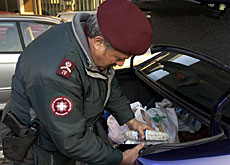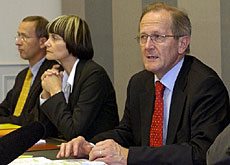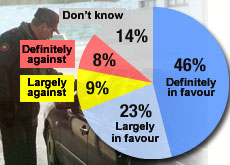Europe debate hits parliament

The Swiss parliament is set to approve a second series of bilateral treaties with the European Union - despite opposition from the Right.
The rightwing People’s Party is using the parliamentary debate – which began in the Senate on Tuesday – to launch its campaign for a nationwide vote on the treaties next year.
Discussions during the winter session of parliament are focusing on a new set of bilateral accords, including closer cooperation on security and asylum, and the taxation of EU residents’ savings income in Swiss banks.
Both houses of parliament are also due to examine a government proposal aimed at gradually opening up the Swiss labour market to the ten new EU member states.
Three of the four main political parties – backed by the business community – have come out in favour of the accords, although the centre-left has expressed reservations.
Only the People’s Party is expected to mount a strong attack against the treaties, also known as Bilaterals II.
Schengen/Dublin accords
“The Schengen agreement [on closer security cooperation] is a back door to the EU,” said People’s Party parliamentarian Luzi Stamm.
He said giving up systematic border checks would lead to an increase in crime in Switzerland.
Stamm added that the outcome of the debate was a foregone conclusion, with the other main parties set to vote for the treaties.
“But we will try to influence the average Swiss voter, because they don’t yet know what the bilateral accords are all about,” Stamm told swissinfo.
He said the party would use the discussions as the first phase of its campaign to press for a nationwide vote next year: “The real battle will begin next April.”
Other dossiers
Besides the Schengen/Dublin accords, there are eight dossiers making up the second set of bilateral treaties, all of which are less controversial.
The Bilaterals II cover a wide range of subjects, including taxation of savings income, customs fraud, processed agricultural products, the EU’s media programme for audio-visual productions, statistics and pension schemes.
An additional bilateral agreement on education and Swiss participation in European training programmes does not require parliamentary approval.
Supporters of the bilateral accords have pointed out that Switzerland has managed to hold on to its cherished banking secrecy after two years of negotiations.
Labour market
But heated debates are expected over a plan to ease access to the Swiss labour market for citizens of the ten new EU member states.
The free movement of people is part of a first set of seven bilateral accords between Switzerland and the old 15-member EU.
Opposition to the agreement has grown over the past few weeks. Trade unions have called for additional measures to prevent wage dumping, especially in the construction and catering sectors.
They say more checks are needed to ensure that salary levels are not undercut by workers from central and eastern Europe.
The People’s Party and isolationist groups are concerned about a rise in unemployment among the Swiss if foreigners take up jobs in the country.
Major impact
Opponents have threatened to call a nationwide vote – likely to be held in the middle of next year – to challenge parliamentary approval of the treaty.
The outcome of the poll would have wider implications for Swiss-EU relations. All previous bilateral accords would be suspended if voters were to reject extending them to the ten new EU member states.
The Swiss Business Federation, economiesuisse, warned such a decision would have “disastrous consequences for the Swiss economy”.
It said the free exchange of labour between Switzerland and its main trading partner was crucial for the Swiss economy.
In an article published in the “Neue Zürcher Zeitung” newspaper, the head of the main employers’ association, Peter Hasler, accused opponents of “playing with fire”.
He added that a rejection of the bilateral accords left only one option for Switzerland: full EU membership.
swissinfo, Urs Geiser
1992: Swiss voters reject European Union Area Treaty with Brussels.
2000: Voters approve a first series of bilateral accords, mainly on trade, labour and transport.
2002: Bilaterals I come into force.
2004: Conclusion of negotiations on Bilaterals II.
The second set of bilateral treaties with the EU includes closer cooperation on security and cooperation, and the taxation of EU residents’ savings in Swiss banks.
An accord on access to the Swiss labour market is due to be extended to the ten new EU states.
Opposition comes mainly from the rightwing Swiss People’s Party and unions.

In compliance with the JTI standards
More: SWI swissinfo.ch certified by the Journalism Trust Initiative





You can find an overview of ongoing debates with our journalists here. Please join us!
If you want to start a conversation about a topic raised in this article or want to report factual errors, email us at english@swissinfo.ch.